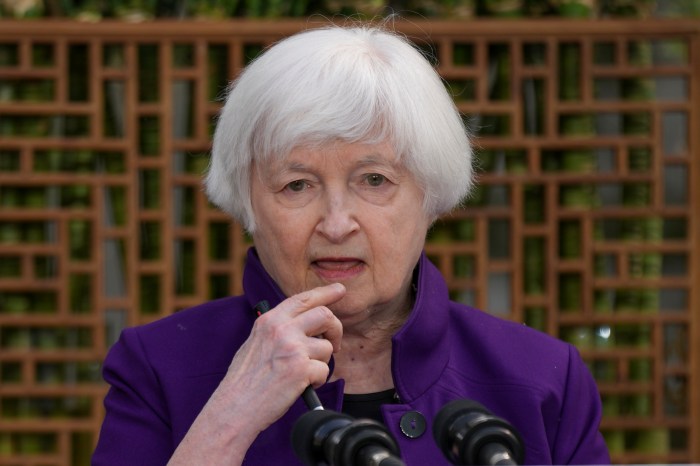WASHINGTON (AP) — The International Monetary Fund has upgraded its outlook for the global economy this year, saying the world appears headed for a “soft landing” — reining in inflation without much economic pain and producing steady if modest growth.
The IMF now envisions 3.2% worldwide expansion this year, up a tick from the 3.1% it had predicted in January and matching 2023’s pace. And it foresees a third straight year of 3.2% growth in 2025.
In its latest outlook, the IMF, a 190-country lending organization, notes that the global expansion is being powered by unexpectedly strong growth in the United States, the world’s largest economy. The IMF expects the U.S. economy to grow 2.7% this year, an upgrade from the 2.1% it had predicted in January and faster than a solid 2.5% expansion in 2023.
Though sharp price increases remain an obstacle across the world, the IMF foresees global inflation tumbling from 6.8% last year to 5.9% in 2024 and 4.5% next year. In the world’s advanced economies alone, the organization envisions inflation falling from 4.6% in 2023 to 2.6% this year and 2% in 2025, brought down by the effects of higher interest rates.
The Federal Reserve, the Bank of Japan, the European Central Bank and the Bank of England have all sharply raised rates with the aim of slowing inflation to around 2%. In the United States, year-over-year inflation has plummeted from a peak of 9.1% in the summer of 2022 to 3.5%. Still, U.S. inflation remains persistently above the Fed’s target level, which will likely delay any rate cuts by the U.S. central bank.
Globally, higher borrowing rates had been widely expected to cause severe economic pain — even a recession — including in the United States. But it hasn’t happened. Growth and hiring have endured even as inflation has decelerated.
“The global economy continues to display remarkable resilience,” Pierre-Olivier Gourinchas, the IMF’s chief economist, told reporters Tuesday. “Most indicators continue to point to a soft landing.”
Still, Gourinchas noted that progress against inflation appears to have “stalled” so far this year and that the pace of price increases for services, such as healthcare and auto repairs, was proving especially stubborn.
Though the world economy is showing unexpected resilience, it isn’t exactly strong. From 2000 through 2019, global economic growth had averaged 3.8% — much higher than the 3.2% IMF forecasts for this year and next. Keeping a lid on the world’s growth prospects are the continued high interest rates, along with sluggish gains in productivity in much of the world and the withdrawal of government economic aid that was rolled out during the pandemic.
The IMF warns that the economic expansion could be thrown off by the continuing adverse effects of higher rates and by geopolitical tensions, including the war in Gaza, that risk disrupting trade and raising energy and other prices.
China, the world’s No. 2 economy, has been struggling with the collapse of its real estate market, depressed consumer and business confidence and rising trade tensions with other major nations. The IMF expects the Chinese economy, which once regularly generated double-digit annual growth, to slow from 5.2% in 2023 to 4.6% in 2024 to 4.1% next year.
But on Tuesday, Beijing reported that China’s economy expanded at a faster-than-expected pace in the first three months of the year, fueled by policies that are intended to stimulate growth and stronger demand. The Chinese economy expanded at a 5.3% annual pace in January-March, surpassing analysts’ forecasts of about 4.8%, official data show. Compared with the previous quarter, the economy grew 1.6%.
Japan’s economy, the world’s fourth-largest, having lost the No. 3 spot to Germany last year, is expected to slow from 1.9% last year to 0.9% in 2024.
Among the 20 countries that use the euro currency, the IMF expects growth of just 0.8% this year — weak but double the eurozone’s 2023 expansion. The United Kingdom is expected to make slow economic progress, with growth rising from 0.1% last year to 0.5% in 2024 and 1.5% next year.
In the developing world, India is expected to continue outgrowing China, though the expansion in the world’s fifth-largest economy will slow, from 7.8% last year to 6.8% this year and 6.5% in 2025.
The IMF foresees a steady but slow acceleration of growth in sub-Saharan Africa — from 3.4% last year to 3.8% in 2024 to 4.1% next year.
In Latin America, the economies of Brazil and Mexico are expected to decelerate through 2025. Brazil is likely to be hobbled by interest high rates and Mexico by government budget cuts.














